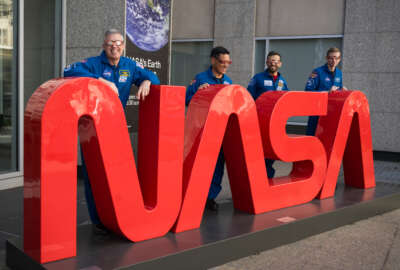How the U.S. Space Force can modernize at a smarter pace
Modernizing space programs while maintaining operations is one of the most challenging things, and rings true for the U.S. Space Force.
Modernizing space programs while maintaining operations is one of the most challenging things, and rings true for the U.S. Space Force. It’s key though to keeping up with near peer competitors in the space front. Joining us earlier to discuss this issue, Dan Laubach, Senior Director of Programs for the technology consulting firm Raft.
Interview transcript:
Dan Laubach So the landscape right now is very interesting. It has evolved a lot over the last couple of years. And what we’ve seen is, and the approach that I’m going to take in answering this, is an approach towards licensed software. And license software really consuming all of the federal government, but very specifically the DoD at a high level, just looking at a number there, $100 billion, according to the GAO, was spent on license software per year, and that’s all federal government, $100 billion. So a lot of money. And where that impacts us as we trickle down into the Space Force and their data problems, a lot of their data is now license locked. It’s put onto platforms that require the government to spend a lot of money on licensing. So it’s a large strain on their limited budget as it is. So that is one area. Another piece of it is the Space Force is has tons of data, probably as much data as any service there is. There is lots of assets that provide them lots of data, and they don’t always have a place to put it or have a usability for it or have the capability to even process it. So that’s something that we are stepping into to help fix by providing our data platform and providing a mechanism for the Space Force to absorb that data, take it in and then use it for actionable results.
Eric White And how do you go about that? What are some of the tools nowadays, the updated tools that are at the Space Force’s disposal and the private sector’s disposal as well. And I imagine that the word AI is going to be implemented here shortly. So why don’t we get that out of the way?
Dan Laubach You can’t have a data conversation without saying AI/ML somewhere. And lots of people are saying it, I don’t think there’s that many that are truly doing it. But what do we do? How are we tackling this? So our approach at Raft, and what I feel as a former government guy is we have to focus on getting modular technology in place, modular capabilities that allow you to use many different apps or tools loaded on top. So one area that we’re tackling is providing a platform for the Space Force. We have a couple of different contracts out there with a couple of different Space Force organizations that allow us to do that. And in one area, we’re helping them ingest different APIs and translate that data into something usable within the unified data layer, which is the Space Force’s data layer. Another thing that we’re providing is a platform that allows them to modernize legacy apps and legacy capabilities onto a modern, cloud based platform. And on top of that, it’s secure and provides a safe mechanism for those apps to live and give the operators the opportunity to use the data in a way maybe they wouldn’t be able to before. Overall, the approach that we see is a government owned, government purpose rights solution that allows modular capability, and it’s really faster to market than anything out there. Keep it simple.
Eric White That keep it simple part, you really hit the nail on the head there for me for my next question, which is the amount of data, as you mentioned, is vast. What do you do to make sure that, you’re doing the job right, but you also have other arenas to consider, other nation states and other non nation states that are trying to advance just as fast as you are. And the modern space race is going to be who can use and utilize the data and the best or the fastest without having it cost too much manpower or money. What do you have to do to make sure that you are keeping up with the Joneses when it comes to space?
Dan Laubach And it is a keeping up with Joneses. And so first we need to flip the traditional model that we’ve seen out of our legacy industry partners and get out of this license software, get out of this vendor locked environment where we have these stovepipes of data. If we want to win the oncoming struggles, we are going to need to figure out a way to get out of the license locked vendor locked data stovepipes. And to do that, it’s just like I said before, it’s providing those platforms and those tools that are government owned, and they allow modularity and flexibility. With the data world, it’s not a one tool fixes everything. It’s going to be multiple tools working together and multiple products working together to get us to make what we call superhumans. So at Raft, we believe that we’re going to take regular humans, that we make them superhumans with the data that we provide them. In order to do that, it’s going to have to take an all hands in approach, and it’s going to not be riddled with license locking software.
Eric White Because most of the innovation within the space sector is focused on the tech part. Just because it’s easier to wrap your head around what the newest and latest hardware can do. From the software side, what is it that can really make somebody want to make some of the new up and comers within the industry want to get on the software side and focus in on that task that you just laid out. Just like I said, it just seems as if let’s call it what it is. It’s not the sexiest part of space, is it?
Dan Laubach It isn’t, but it’s the most enabling part of space. The data is everything at this point. And so, yes, it’s not something you can centralize quite as easy, but it is the area that I think we can see the most improvement, the fastest. And for the small businesses out there, and for us, we want to push and urge the DoD and the Space Force, for that matter, to continue these innovation ideas and innovation strategies where they’re pulling at the small businesses and the nontraditionals, and pushing for outside, things that have worked in the commercial world and bringing them over to the Space Force. Things that are working in other parts of the DoD, and bringing them over and not being stuck with a single large vendor. So in order to tackle that, we got to continue to foster our industrial base to foster new ideas coming up, and give the opportunities to those that have those great ideas to be able to execute. And that’s going to go with building a modular platform. If it’s not modular, you cannot enable that. If it’s stuck with one vendor that has very steep licenses information protection policies in place, it’s going to be very difficult for that to happen.
Eric White And let’s counter that. And I imagine it’s a balance as most things in life are. It’s probably both answers, but having those IPs, they’re there for a reason. You want to make sure that you protect any sort of new technology. Everything can’t be open source.
Dan Laubach That’s a great point. And so that’s why we’re pushing for government purpose rights. We’re not saying that everything needs to come open source and everything needs to be open for everybody. But at the same token, we need to build things in a way that promote modularity and promote flexibility. And sometimes those two things get confused where we are so worried about the IP that we end up building a product that is not usable by everybody. I say we, I say the industry at large. And so getting away from that mindset and saying, Yes, we have to protect the IP, we have to protect what’s important. But at the same time, how do we do it in such a way that it enables other applications, other software capabilities to come together and work together without complete redesigns every time we need a new capability.
Eric White Working with multiple agencies, especially in the Defense Department, as you all have, is this being seen as a bigger priority now than it was just a few years ago? And I’d like to use that as an opportunity to kind of hem in on yourself. Getting into this arena, is this what you had in mind when you wanted to get into the space field and the data field? Are you a data man, a space man? What are you?
Dan Laubach A little bit history of me, I was an acquisition officer in the Air Force. I got out and I came to Raft. And one of the reasons why I came to Raft was because of their capabilities, and their non-licensed locking mentality. And so as a government guy, I was stuck with some vendors that were so expensive that I was unable to continue to use them. And we lost some great capabilities that warfighters needed because of that. So the answer the first part of your question there, my background is mostly Air Force, a little bit of Space Force. And I’m getting smarter on Space Force every day. And I’m really into the data, I’m a nerd about the data. More data, the better. But at the end of the day, how do you make that usable? And that’s the real challenge that I see and that I try to tackle is how do you take a lot of data and make it usable? And it’s going back to our mission again with making humans into superhumans. How can you create visuals and how do you create transformations that allow folks to make decisions from all that data? And so, yes, I’m a data nerd and that’s probably where I reside most.
Copyright © 2025 Federal News Network. All rights reserved. This website is not intended for users located within the European Economic Area.
Eric White is news anchor and Federal Drive producer at Federal News Network.
Follow @FEDERALNEWSCAST






